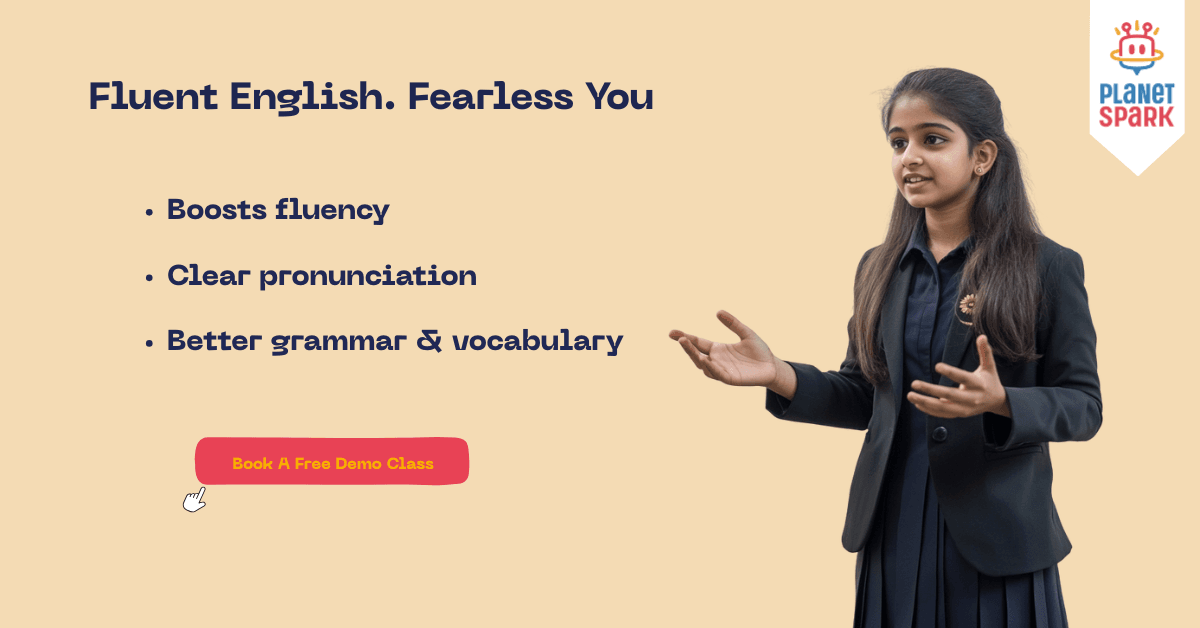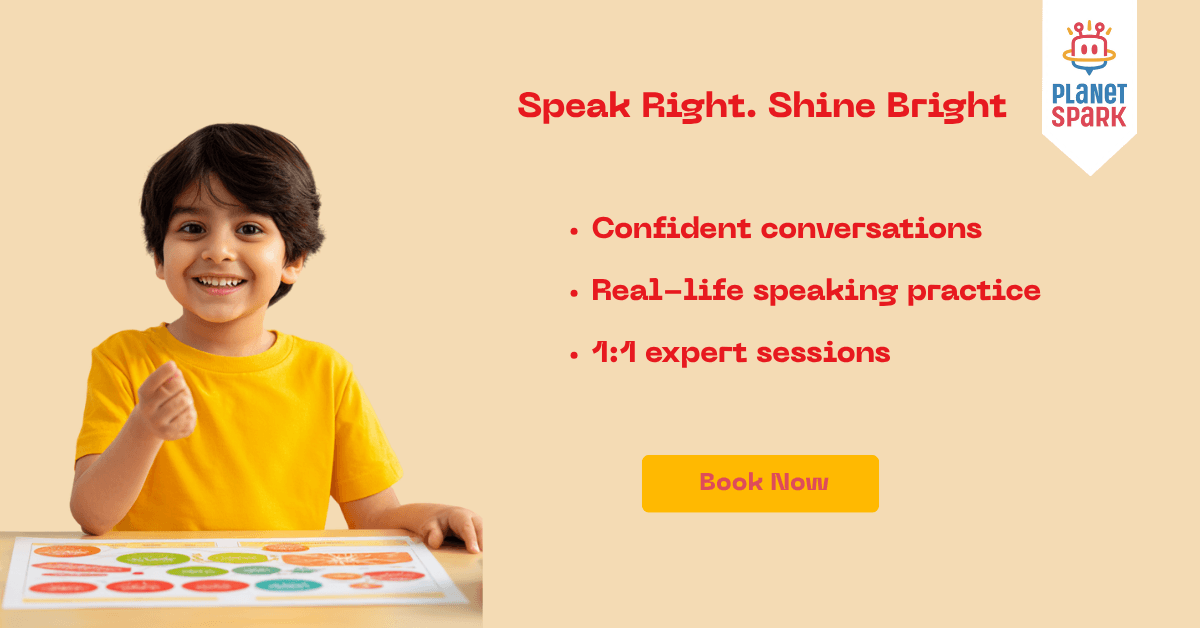Conversation in English: Tips for Kids & Beginners
Last Updated At: 23 Jul 2025
12 min read

Table of Contents
- Why is Conversation in English Important
- The Basics of a Good Conversation
- Simple Conversation for Kids in English
- Conversation Between New Friends in English
- Daily Conversation Sentences in English
- Role-Playing Exercises to Improve Conversations
- Tips for Parents and Teachers
- How PlanetSpark Helps Boost English Conversations
- Why PlanetSpark is the Best Choice for English Conversations
- Games and Activities That Build Conversational Fluency
- Common Challenges and How to Overcome Them
- Storytelling: A Powerful Tool to Improve Conversation in Eng
- English Conversations for Different Everyday Situations
- Making Mistakes is Part of the Process
- Encouraging Peer Conversations at Home
- Parents as Conversation Partners
- Advanced Conversation Tips for Growing Learners
- Conclusion
- FAQs
Mastering conversation in English is one of the most empowering skills anyone- especially children and young learners- can develop. It opens doors to understanding, connection, and confidence in personal and academic life. From engaging in casual chats to making new friends, learning to hold meaningful conversations builds not only language fluency but also social intelligence.
In this comprehensive guide, we’ll explore different types of English conversations- from daily interactions to making new friends- and share practical examples, simple templates, and tips to improve your or your child’s communication skills. Whether you're a parent looking to support your child or an educator looking for conversation resources, this article is for you.
Why is Conversation in English Important
Effective conversation in English helps children and adults alike to:
Express thoughts clearly
Ask and answer questions confidently
Understand and respond to others politely
Build friendships and relationships
Participate in classroom and public settings
Unlike rote grammar or vocabulary drills, conversational practice focuses on real-world usage- where actual fluency begins.
The Basics of a Good Conversation
Before jumping into dialogues and examples, it's crucial to understand the key elements of a successful English conversation:
Greeting and Initiating – Saying "Hi," "Hello," or "Good morning" to start.
Listening Actively – Paying attention to what the other person says.
Responding Appropriately – Answering questions, asking follow-ups.
Using Polite Expressions – Phrases like "please," "thank you," and "excuse me."
Closing the Conversation – "Bye," "See you later," "Take care."
Simple Conversation for Kids in English
Children need structured, easy-to-follow dialogues to build confidence in speaking. Here are a few simple conversations for kids in English examples suitable for home or classroom practice.
1. At the Park
A: Hello! What’s your name?
B: My name is Arya. What’s your name?
A: I’m Rohan. Nice to meet you!
B: Nice to meet you too. Do you want to play on the swing?
A: Yes! Let’s go.
2. In the Classroom
Teacher: Good morning, students.
Class: Good morning, ma'am!
Teacher: How are you today?
Student: I’m fine, thank you.
Teacher: Great! Let’s start our lesson.
These short exchanges build foundational conversation skills, vocabulary, and confidence.

Conversation Between New Friends in English
Meeting new people can be exciting but nerve-wracking. Knowing how to conduct a conversation between new friends in English helps kids navigate social settings confidently.
Example Dialogue:
A: Hi, I’m Zoya. This is my first day here.
B: Hi Zoya! I’m Ria. Welcome to our school.
A: Thank you! What subject do you like?
B: I love English. What about you?
A: I like science. Do you want to sit together at lunch?
B: Sure! Let’s be friends.
This type of friendly exchange builds social comfort, especially for new students or during playdates.
Daily Conversation Sentences in English
Daily practice is the key to fluency. Here’s a list of commonly used daily conversation sentences in English that learners should know and use:
Greetings and Introductions:
Hello! How are you?
Good morning!
My name is ______.
Nice to meet you.
At Home:
What’s for breakfast?
I’m ready for school.
Can you help me, please?
I finished my homework.
At School:
May I go to the washroom?
What’s the answer to this question?
I forgot my notebook.
Let’s play during recess.
Out and About:
How much does this cost?
I want to buy some chocolates.
Where is the nearest washroom?
Can I have a glass of water?
Polite Phrases:
Please help me.
Thank you so much!
You’re welcome.
I’m sorry.
Excuse me.
Consistent use of these sentences enhances fluency in day-to-day communication.
Role-Playing Exercises to Improve Conversations
Role-play is a fantastic method to make learning interactive. Ask kids to act out real-life scenarios with each other. Here are a few ideas:
1. Buying Ice Cream
A: Hello! I’d like one chocolate ice cream, please.
B: Sure! That will be 20 rupees.
A: Here you go.
B: Thank you! Enjoy your ice cream.
2. Asking for Help with Homework
A: Hi! Can you help me with this math problem?
B: Of course! What question is it?
A: Question 4 from page 32.
B: Let’s solve it together.
3. Conversation in a Library
A: Excuse me, where is the English storybook section?
B: It’s in the second aisle on the right.
A: Thank you!
B: You’re welcome.
These short practice dialogues are powerful tools for building fluency and comprehension

Tips for Parents and Teachers
To nurture conversational skills in children, follow these strategies:
Model Good Conversation: Speak slowly and clearly with your child in English.
Encourage Questions: Let kids ask questions about everything around them.
Celebrate Mistakes: Let them know it’s okay to make mistakes.
Use Visual Aids: Flashcards, real objects, or picture books aid understanding.
Practice Regularly: Encourage short, daily English conversations at home.
How PlanetSpark Helps Boost English Conversations
Let Every Word Lead to Better Communication!
With PlanetSpark’s AI-powered spoken English classes, your child doesn’t just learn English- they learn to express ideas, feelings, and opinions fluently and confidently.
Why choose PlanetSpark?
1:1 live interactive sessions
Personalized attention to pronunciation and grammar
Regular feedback with AI fluency reports
Activities focused on daily English speaking and conversation building
Your child’s confident English journey begins today. Book a Free Trial with PlanetSpark Now!
Why PlanetSpark is the Best Choice for English Conversations
If you’re serious about improving your child’s conversation in English, PlanetSpark offers a unique, result-driven platform that goes far beyond typical learning apps or pre-recorded videos.
Live, Interactive English Conversations Daily
Unlike passive video learning, PlanetSpark ensures that your child engages in live, real-time conversations daily- across real-world contexts like home, school, interviews, and travel scenarios. These sessions are designed to encourage spontaneous speaking and active listening.
Accent Neutralization & Clear Articulation
Dedicated modules help reduce Mother Tongue Influence (MTI) through phonetic training and pronunciation drills, ensuring children speak clearly and confidently.
Lexical Resource Enhancement
Vocabulary isn’t taught in isolation. Instead, kids learn word groups, phrases, and collocations in context- making it easier to remember and use in actual conversations.
Situational Dialogues & Role Plays
From ordering food to giving presentations, kids practice a wide range of real-life dialogues, sharpening their fluency and thinking-on-the-spot abilities.
Instant Feedback & AI Fluency Reports
Every session includes real-time correction with AI tools that assess grammar, pronunciation, and flow- shared as periodic fluency reports with parents.
Speaking Confidence Trackers
Teachers regularly update performance feedback, providing insights and action plans to help each child grow into a confident English speaker.
Enroll your child with PlanetSpark today and watch them thrive in every conversation!
Games and Activities That Build Conversational Fluency
Children learn best through fun! Here are a few creative ideas to boost conversation in English:
1. Question Ball Game
Toss a ball. Whoever catches it must answer a question in English:
What is your favorite food?
What do you do after school?
2. Story Chain
Each child adds a sentence to a story in turn, like:
“Once there was a cat…”
“It loved to eat fish…”
“One day, it went to the market…”
3. Picture Talk
Show a picture (e.g., a market scene), and ask children to describe what they see using daily conversation sentences in English.
These activities make speaking enjoyable and remove fear from the process.
Common Challenges and How to Overcome Them
1. Shyness or Fear of Mistakes
Solution: Create a safe space where mistakes are treated as learning opportunities.
2. Limited Vocabulary
Solution: Introduce 5 new words a day and revise them through games and flashcards.
3. Pronunciation Problems
Solution: Use rhymes, phonics games, and apps like PlanetSpark’s AI feedback tool to improve clarity.
Storytelling: A Powerful Tool to Improve Conversation in English
Storytelling isn’t just a fun activity - it’s also a powerful method to develop structured thinking, sentence formation, and fluency in conversation in English. When children learn to narrate a story, they naturally practice grammar, vocabulary, tone, and body language.
Here’s how storytelling helps:
Builds logical sequencing: Children learn to say what happened first, next, and finally—a crucial skill in conversations.
Improves descriptive language: “The lion was huge and scary” is more expressive than just “There was a lion.”
Encourages confident speaking: Sharing stories with peers, teachers, or parents builds public speaking confidence.
Try this exercise at home:
Ask your child to pick a picture.
Tell them to describe what they think is happening.
Let them add a beginning, middle, and end.
You’ll be surprised how naturally this turns into a fluent daily conversation in English.
PlanetSpark’s creative storytelling modules include picture talk, story sequencing, and expression practice- making it the perfect foundation for fluent English speakers.
English Conversations for Different Everyday Situations
To be truly fluent, children need to adapt their English to different everyday situations. Here are some examples of daily conversation sentences in English that children can use depending on the context:
At the Doctor’s Clinic
Child: Hello, Doctor. I don’t feel well today.
Doctor: What are your symptoms?
Child: I have a sore throat and a headache.
Doctor: Don’t worry. I’ll give you some medicine.
During a School Activity
Child 1: What project are you working on?
Child 2: I’m making a volcano model.
Child 1: Wow! That sounds exciting. Can I help?
Child 2: Sure! Let’s work together.
At a Restaurant
Child: Excuse me, I’d like a cheese pizza, please.
Waiter: Would you like a drink with that?
Child: Yes, one lemonade, please.
Waiter: Coming right up!
Practicing these interactions helps children gain confidence to speak clearly in real-life scenarios.
PlanetSpark’s situational conversation activities make kids comfortable speaking in such scenarios through guided role-plays and feedback sessions.
Making Mistakes is Part of the Process
Many children hesitate to speak because they fear making mistakes. But mistakes are natural stepping stones to mastery in learning any language. It's important to foster an environment where:
Kids are encouraged to try, even if imperfect
Corrections are made kindly, not critically
Progress is celebrated, however small
PlanetSpark integrates positive reinforcement strategies and instant AI-powered correction tools, helping kids improve without feeling judged.
Encouraging Peer Conversations at Home
Practicing English with friends or siblings can accelerate progress. Here's how parents can encourage conversation between new friends in English at home:
Playdate Themes: Set themes like "shopping day," "classroom time," or "picnic in the park," and encourage role-playing.
English-Only Zone: Create short time slots in the day where everyone must speak only in English.
Question of the Day: Introduce a daily discussion question such as:
"If you had a superpower, what would it be?"
"What do you like most about your best friend?"
These engaging prompts lead to extended English interactions and develop spontaneous thinking.
PlanetSpark’s curriculum is built to replicate such natural peer conversations- through storytelling circles, debate corners, and collaborative learning rooms.
Parents as Conversation Partners
You don’t need to be an English expert to help your child. Being a supportive conversation partner at home is enough. Here’s how you can participate:
Ask open-ended questions like “What did you enjoy most at school today?”
Repeat and expand: If your child says, “I saw a bird,” say, “Wow! What color was the bird? Was it big or small?”
Share your day in English, modeling daily conversation.
Even just 10–15 minutes a day of English dialogue can make a huge impact.
And if you’re looking for structured guidance, PlanetSpark fills in all the gaps with expert teachers, AI tools, and engaging course content tailored for kids.
Advanced Conversation Tips for Growing Learners
As children become more confident, gradually introduce more nuanced conversations like:
Sharing opinions (“I think pizza is the best!”)
Asking open-ended questions (“What did you do during your vacation?”)
Telling stories with a beginning, middle, and end
Let them practice conversation between new friends in English by writing and performing short skits.
Conclusion
Mastering conversation in English isn’t about memorizing lines- it’s about building confidence, curiosity, and clarity. From simple conversation for kids in English to advanced storytelling, every step taken improves fluency and social skills. Daily practice, parental encouragement, and the right educational support make a world of difference.
Want your child to speak English fluently and confidently?
Join thousands of parents who trust PlanetSpark’s proven English speaking program.
Book a Free Trial Today and help your child become a confident communicator!
FAQs
Q1. How can I improve my child’s conversation in English?
Ans. Start with short daily interactions. Use English during meals, playtime, or bedtime stories. Enroll them in structured courses like PlanetSpark for expert guidance.
Q2. What are some simple conversations for kids in English?
Ans. Greetings, asking names, sharing likes and dislikes, or talking about daily activities are great starters. E.g., “What’s your name?” “I like drawing.”
Q3. What is a good example of a conversation between new friends in English?
Ans. "Hi, I’m Tina." "Hello! I’m Sameer. Nice to meet you. Want to play together?" "Yes, let’s go!" This kind of talk is friendly and easy for kids to try.
Q4. What are some useful daily conversation sentences in English?
“I am hungry.”
“Can I go out?”
“I like your dress.”
“Thank you for helping me.”
Q5. How does PlanetSpark help in learning English conversations?
Ans. PlanetSpark offers 1:1 live classes, activity-based learning, AI-powered fluency assessments, and experienced trainers who focus on real-time conversation practice for all age groups.
Personalized Communication Report
Record a video to get a AI generated personalized communication report for your child
Select Learner's Class

Hi There, want to try these
tips for your child with
LIVE with our expert coach?
Let's check your child's
English fluency
